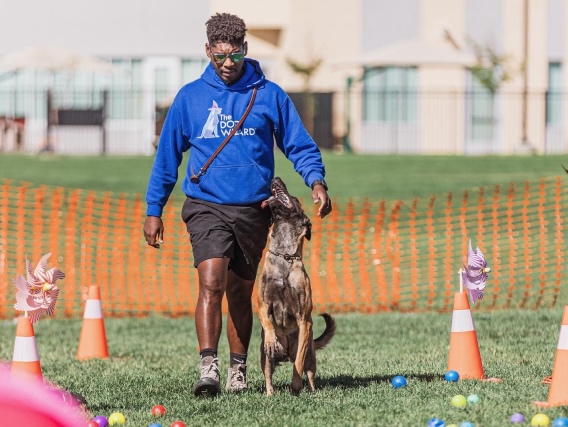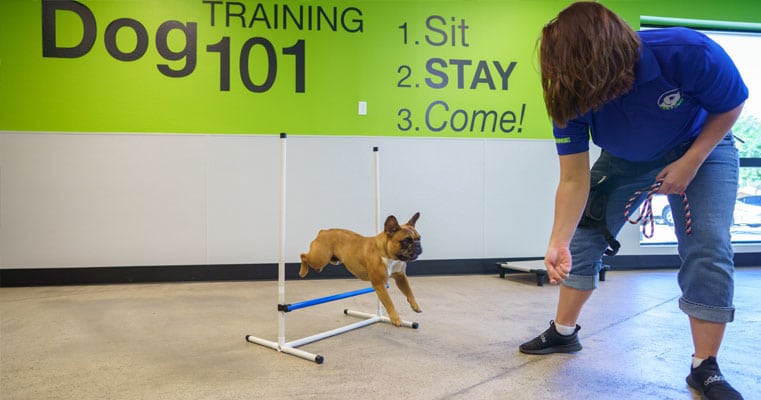Checking Out Alternatives for Dog Training Charlotte: What You Need to Know
Checking Out Alternatives for Dog Training Charlotte: What You Need to Know
Blog Article
Unlock Your Dog's Potential: Proven Pet Training Methods for Success
Effective dog training is a nuanced process that depends upon understanding canine habits and employing scientifically backed techniques. dog training charlotte. By integrating positive reinforcement, establishing clear commands, and focusing on socialization, pet proprietors can cultivate a productive connection with their family pets. However, challenges frequently develop that need tailored services and a person technique. Checking out these proven methods reveals not only the possibility for behavior improvement but additionally the much deeper bond that can be developed in between proprietor and canine. What crucial techniques must be thought about to genuinely unlock your pet's possibility?
Comprehending Dog Behavior
Comprehending dog actions is important for efficient training and fostering a positive connection in between pets and their owners. A comprehensive grasp of canine body movement, articulations, and social communications is essential for recognizing their requirements and emotions. Dogs interact primarily through non-verbal hints; for instance, a wagging tail may indicate excitement, while pinned ears can indicate concern or submission.

Furthermore, environmental factors play a substantial function fit a canine's actions. Adjustments in routine, new surroundings, or the presence of strange individuals can cause tension or stress and anxiety in canines. Recognizing these triggers makes it possible for proprietors to alleviate unfavorable reactions and develop ideal training techniques.
Inevitably, a deep understanding of canine habits lays the foundation for successful training methods, improving both behavior and the general bond between the dog and its proprietor. Dog training. This knowledge is indispensable for promoting a well-adjusted, delighted canine buddy
Positive Support Strategies
Efficient training depends greatly on positive support techniques, which have been revealed to yield considerable outcomes in shaping preferred behaviors in dogs. This technique entails compensating a pet dog for showing details behaviors, therefore boosting the chance that these habits will certainly be repeated. Incentives can take numerous forms, consisting of treats, praise, playthings, or play, relying on what inspires the specific pet.

It is important to progressively eliminate rewards as the dog learns the behavior, transitioning to intermittent support. This approach keeps the behavior gradually while protecting against dependence on consistent benefits. By focusing on positive support, instructors can cultivate a relying on relationship with their dogs, advertising a healthy and balanced and participating training setting that boosts total obedience and efficiency.
Developing Consistent Commands
A basic element of successful pet dog training is the establishment of consistent commands. Consistency in commands is important for effective communication between the instructor and the dog. When commands are consistent, pets learn to link details words with desired actions, which accelerates the training procedure and enhances understanding.
To develop consistent commands, look at here it is essential that all family members utilize the exact same terminology and motions. If one person utilizes "sit" while an additional says "sit down," it can create complication for the pet dog. Select clear, distinct words for commands and guarantee everybody included in the canine's training sticks to these choices.
Reinforce commands via regular practice, making sure that the canine gets ample opportunities to react appropriately. When a dog efficiently adheres to a command, prompt positive reinforcement ought to adhere to.
Lastly, hold your horses. Developing constant commands requires time and effort. With commitment and quality, you will assist your pet dog establish a strong understanding of assumptions, ultimately resulting in a well-behaved companion.
Socialization and Exposure
Interacting socially a dog is important for promoting a positive and well-adjusted friend. This procedure includes revealing your dog to a variety of environments, individuals, and other animals to establish their social abilities and adaptability. Early socializing, preferably between the ages of three to fourteen weeks, is crucial, as it lays the foundation for a canine's future behavior.
Throughout socialization, goal to supply favorable experiences in different settings, such as parks, active streets, and homes with other pet dogs. Introduce your dog to numerous stimuli, consisting of noises, views, and scents, ensuring that each encounter is rewarding. This direct exposure helps alleviate concern and anxiety, leading the way for a more resistant dog.
Engaging in controlled team play sessions with other pet dogs can additionally boost social skills, educating your animal ideal communications and boundaries. Focusing on socializing will dramatically add to your pet's total happiness and actions throughout their life.
Overcoming Common Educating Challenges

Dogs may struggle to focus in busy or unfamiliar settings. Slowly desensitize your pet dog to interruptions by starting training in a you could try here quiet atmosphere and slowly introducing more stimulations as they become skillful.
Additionally, behavior concerns like leaping or excessive barking can end up being irritating. Address these by instructing alternative actions, such as resting smoothly when greeting visitors. Consistency and perseverance are vital; strengthen desired actions constantly and prevent scolding, which can result in confusion.
Lastly, recognize that each pet dog is unique, and training timelines might vary. Tailor your approach to your canine's specific demands, and seek professional advice if required. With willpower and the right strategies, conquering these difficulties can lead to a trained, happy canine buddy.
Final Thought
In conclusion, unlocking a dog's potential necessitates a thorough strategy that integrates an understanding of canine behavior, the application of favorable reinforcement techniques, and the facility read this of regular commands. Early socialization and direct exposure to diverse atmospheres additionally improve a dog's versatility and self-confidence. By attending to typical training difficulties with customized strategies and patience, a harmonious and cooperative relationship between canine and handler can be cultivated, inevitably causing a well-behaved companion capable of flourishing in various situations.
Effective pet training is a nuanced procedure that pivots on recognizing canine habits and employing medically backed strategies.Understanding pet habits is essential for effective training and fostering a positive connection between dogs and their owners.Reliable training depends heavily on favorable support strategies, which have been shown to generate significant results in shaping wanted habits in pets. When commands are consistent, dogs discover to link certain words with desired actions, which increases the training procedure and boosts understanding.
In final thought, unlocking a pet's possible demands a thorough approach that includes an understanding of canine actions, the application of favorable support techniques, and the establishment of consistent commands.
Report this page